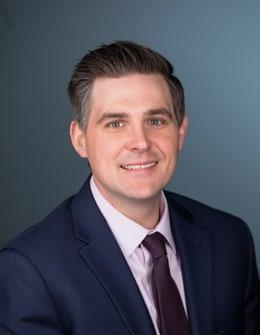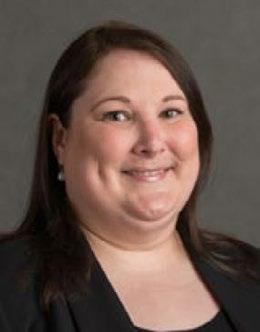
4 minute read
Center for resear Ch to transform systems for family, Community & soCial JustiCe launChes
New center will focus on work that helps families thrive
Imaginethis scene: A young child is the last child left at school pickup every day. Noticing this pattern, their teacher — a mandated reporter — becomes concerned and calls child protective services to report a family for possible neglect, prompting a safety investigation of the family. The children are terrified. The parents are frantic and confused. It’s an encounter no one, from the family to the child welfare system, wanted to happen. Now, rewind this scenario. What if rather than reporting, the teacher took a supporter approach, connecting the family with the community-based resources and supports they needed to thrive, preventing them from unnecessary investigation and involvement with the child welfare system?
Advertisement
A team of KU School of Social Welfare researchers is working to bring about that kind of child welfare system transformation. They envision a new approach, focused on family well-being, where systems listen to the needs and aspirations of communities and work collaboratively to create a proactive, responsive, and equitable network of services and supports. This system will help parents with the everyday challenges of caregiving as well as unforeseen crises that can turn their lives upside down. The entire system and community become driven to keep families intact and children safe.
Together, these visionary co-directors — Drs. Becci Akin, Kaela Byers, and Jared Barton — have created the Center for Research to Transform Systems for Family, Community & Social Justice (CRTS). CRTS, which launched in the fall 2022, engages in projects, initiatives and research, including implementing and evaluating innovative approaches to serving children, families, and their communities.
Currently, nine large multi-partner projects and initiatives are housed under the umbrella of CRTS, all of which are focused on family, community, and social justice (see sidebar). While most of the work is being done in Kansas, a few of the projects are national in scope, currently serving 10 additional states. The faculty associated with the CRTS are also recognized experts in the child welfare field and will present at national and international conferences in 2022, including the Kempe Center International Virtual Conference, the Council for Social Work Education Annual Conference and the Kansas Governor’s Conference for the Prevention of Child Abuse and Neglect.
“We want to transform the system as it currently exists so it is equitably serving families, so every family has an opportunity for positive outcomes, so that it’s not a punitive system, and when families do experience crises and need additional support, it is easily accessible and delivered without stigma,” explains Kaela Byers, Ph.D., research faculty member and one of the center’s co-founders.
Crts ProJeCts suPP ort Children and families in a Variety of Ways
Currently, the faculty researchers who make up the CRTS are engaged in a wide array of funded projects focused on system transformation:
• Kansas Strong for Children and Families
• Family First Evaluation
• Fatherhood FIRE Evaluation
• Family Strong
• KinVest
• Absent Youth Project
• Results Oriented Management (ROM Reports)
• Safe Sleep Evaluation
• Child Sexual Abuse Prevention Evaluation
“We strive to do our work in a collaborative, community-engaged and community-driven, and strengthsoriented manner,” elaborates Becci Akin, Ph.D., professor and Ph.D. program director, one of the CRTS co-founders. “Importantly, we have a multi-system focus. Rather than solely focusing on individual level solutions, our work explores the structural and institutional contributors that establish everyday practice with families and children. This involves working with systems so they can hear and honor communities’ lived expertise. It also involves working across sectors to build more integrated, easily available, responsive, culturally relevant, and equitable systems.”
Jared Barton, Ph.D., research faculty and a co-founder of the CRTS, shares an example of how this multi-system, multisector approach is being used in two of the Center’s projects, Kansas Strong for Children and Families and the Family First Evaluation: “Kansas Strong and Family First partner to support an Interagency and Community Advisory Board at statewide and local levels intended to identify gaps and barriers in the service array and identify solutions to those so families and communities are supported to care for their children ,” he says. “They are comprised of all sectors — healthcare, law enforcement, education, child and family services — as well as individuals in the community with lived experience in child and family service systems including child welfare.”
“These are all our kids, so we all need to be part of the solution, to make sure we are not duplicating efforts, sending families through a maze of resources,” adds Byers. “We want to bring all of the players together — all the professionals, all the interested parties in the community — so we ensure that we are aligning our systems with needs and strengths inherent in the community and among families.”
CRTS is also focused on using anti-racist, anti-oppressive methods in their research and is committed to working toward racial, social and environmental justice. The founding principal investigators have pledged to move beyond acknowledging and studying the historic and structural racism in the United States to working to dismantle the systems of oppression through their work.
For example, through the Wyandotte County Rising project funded through the KU Research Rising Racial Equity awards and an initiative under Kansas Strong, the Center is collaborating with a group of Black community leaders to hear their recommendations for what should be done in child welfare to better support families of color. The recommendations will be presented to the Kansas Department for Children and Families to develop and execute an action plan accountable to the community and their priorities.
Another example is the inclusive approach used by the Kansas Strong project to develop a child welfare workforce coaching program, KanCoach. “One of the things we did in developing this program was to hold focus groups with parent partners who have lived expertise with the system, to share the plan and materials, to hear from them what are their priorities, what is missing, what didn’t we think of,” Akin explains. Byers adds, “That feedback was incredibly rich, and we used it as the basis for revamping and creating new learning collaboratives for the workforce, specifically around anti-racist practices and infusing family voice throughout this work.”
While the faculty researchers are engaged in a wide array of projects aimed at improving the lives of children and families in Kansas and beyond, everything the CRTS does will align with its simple but powerful mission, says Barton:
Crts’s founders share a Passion for imProVing the liVes of families
The CRTS is a collection of faculty researchers, research staff and student researchers who share a focus. Founding principal investigators from the School of Social Welfare include:
• Becci Akin, Ph.D., Professor and Ph.D. Program Director; CRTS CoDirector
• Kaela Byers, Ph.D., Associate Research Professor; CRTS Co-Director
• Jared Barton, Ph.D., Assistant Research Professor; CRTS Co-Director

• Pegah Naemi-Jimenez, Ph.D., Associate Researcher
• Whitney Grube, Ph.D., Associate Researcher

• Amanda Brown, Ph.D., Associate Researcher
Additional faculty will be invited to join CRTS as their research aligns with its work.







